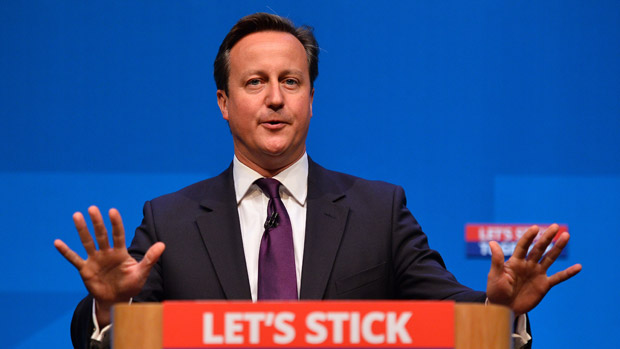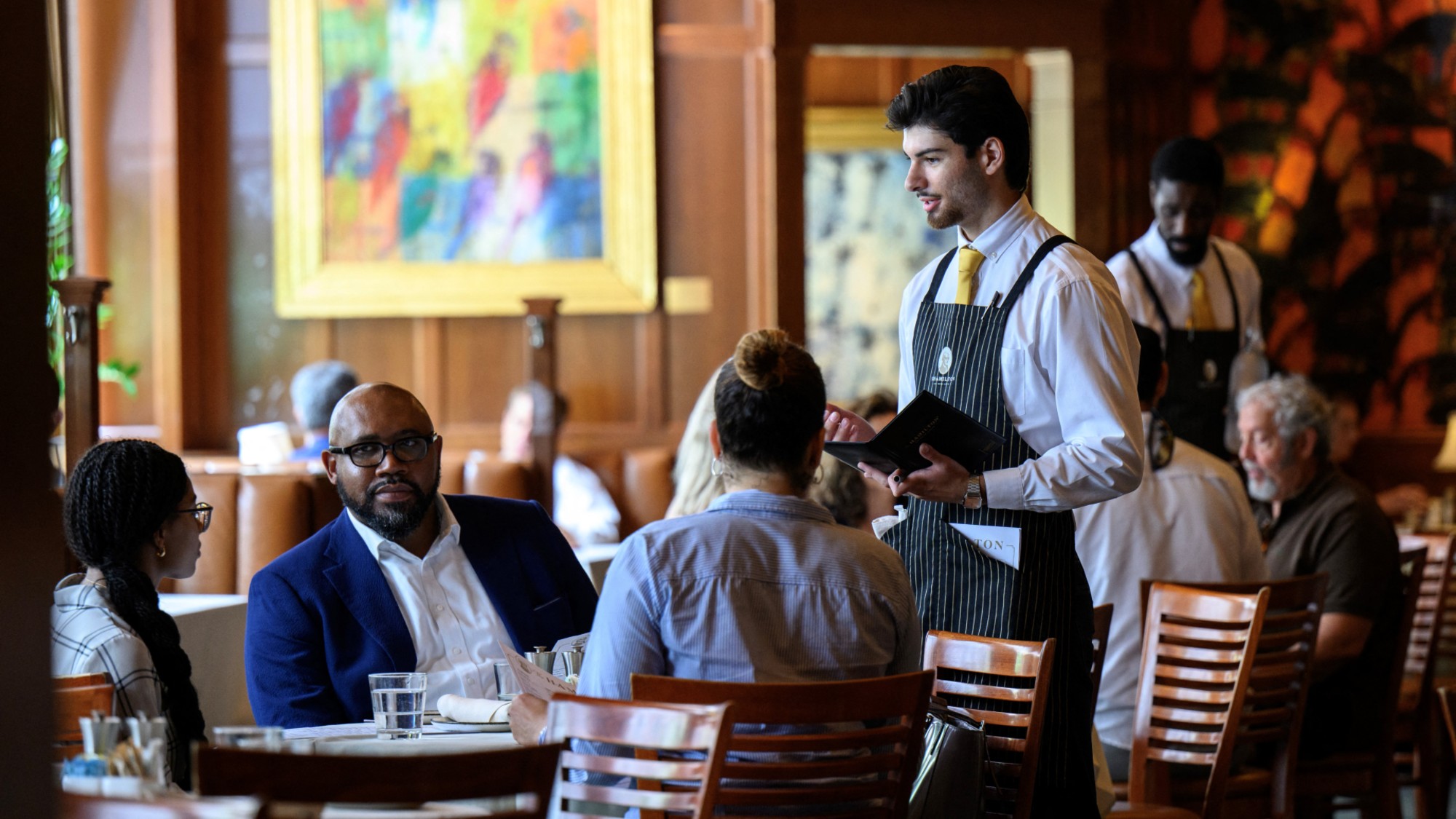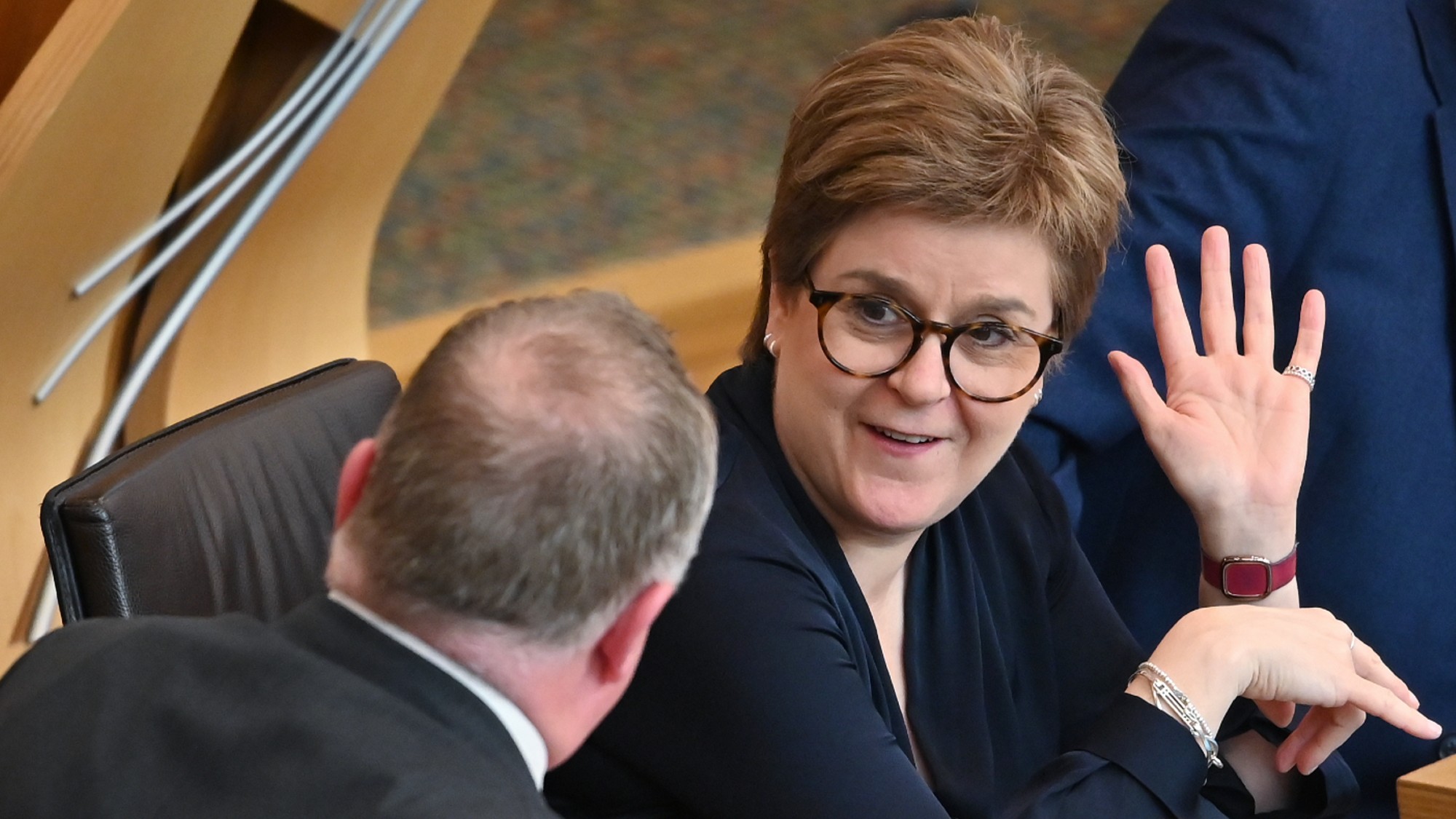Scottish independence: UK party leaders pledge new powers
Cameron promises he 'won't be here forever' but warns that leaving the UK will be a 'painful divorce'

A free daily email with the biggest news stories of the day – and the best features from TheWeek.com
You are now subscribed
Your newsletter sign-up was successful
The leaders of the UK's three main political parties have signed a joint pledge to devolve "extensive new powers" to Scotland if voters reject independence.
In a final drive to stop the United Kingdom from separating, David Cameron, Ed Miliband and Nick Clegg signed the pledge, which promises to begin the process of devolving new powers this Friday, the day after the referendum, if Scots vote No.The written declaration, which appears on the front page of Scotland's Daily Record newspaper, promises:
- to preserve the Barnett funding formula, which means the Scottish Parliament will continue to receive a proportionate share of funding from the Treasury for health, education and justice but can allocate the money in whichever way they choose.
- to deliver "extensive new powers" for the Scottish Parliament within the timetable agreed by the three parties.
- that the final say on funding for the NHS will lie with the Scottish government.
The leaders also stated that they "agree that the UK exists to ensure opportunity and security for all by sharing our resources equitably across all four nations to secure the defence, prosperity and welfare of every citizen".However, the Yes campaign insists that the only guarantee of more powers is a vote for independence.The pledge comes after Cameron gave an "emotional" speech in Aberdeen last night, warning voters that separation would be a "painful divorce", reports the Daily Telegraph.The Prime Minister promised Scotland that he "won't be here forever" and told Scots "head and heart and soul, we want you to stay".Independence would mean stricter borders, with people forced to "pack their passport when they're going to see friends and loved ones", he said.
The Week
Escape your echo chamber. Get the facts behind the news, plus analysis from multiple perspectives.

Sign up for The Week's Free Newsletters
From our morning news briefing to a weekly Good News Newsletter, get the best of The Week delivered directly to your inbox.
From our morning news briefing to a weekly Good News Newsletter, get the best of The Week delivered directly to your inbox.
"Don't think: 'I'm frustrated with politics right now, so I'll walk out the door and never come back,'" warned Cameron. "If you don't like me, I won't be here forever. If you don't like this government, it won't last forever. But if you leave the UK, that will be forever."
Scottish independence: Queen urges voters to 'think carefully'
15 September
The Queen has broken her silence on the issue of Scottish independence just days before the referendum to say that she hopes "people will think very carefully about the future".
In what commentators are calling a highly unusual breach of protocol, the Queen made the comments to well-wishers after a service at Crathie Church near Balmoral Castle.
A free daily email with the biggest news stories of the day – and the best features from TheWeek.com
Her comments are "being viewed as the clearest sign yet she hopes for a No vote on Thursday", according to the Daily Telegraph.
Previous reports suggested that the Queen was growing increasingly concerned about Scotland breaking from the union. However, Buckingham Palace insists that the monarch is "above politics". It previously said in a statement that "any suggestion that the Queen would wish to influence the outcome of the current referendum campaign is categorically wrong."
"Her Majesty is firmly of the view that this is a matter for the people of Scotland."
Observers say her comments were a deliberate move to send a message to voters. "This wasn't a slip of the tongue by the head of state of the United Kingdom," according to the BBC's royal correspondent Peter Hunt, "rather a reflection of how seriously she, like many others, views the significance of Thursday's vote".
As the latest polls put the votes neck and neck, both campaigns have interpreted her comments as support for their side. A spokesperson from Yes Scotland told the Telegraph she was echoing their message to voters to "think very carefully about this one opportunity that Scotland will have on Thursday to choose our future."
Labour MP Simon Danczuk said he was pleased she had finally made her views on the referendum public. "She means that the people of Scotland should stay with England and the rest of the United Kingdom", he said.
For a balanced, in-depth discussion of the historical context of the current debate about Scottish independence, read The Week's ebook, Independence for Scotland?, available now from Amazon.
The pros and cons of Scottish independence
Scottish independence: Salmond Clashes with BBC and Westminster
12 September
With less than a week to go until the referendum, Alex Salmond has accused the government of leaking market-sensitive information to the BBC about the future of the Royal Bank of Scotland (RBS).
The Scottish First Minister is demanding a full inquiry after alleging that the Treasury 'tipped-off' the BBC, calling it a matter of "enormous gravity".
He said "Treasury fingerprints [are] all over this story" and that it was a "spectacular example of the sort of campaign tactics of intimidation and bullying that have served the 'No' campaign so badly," the BBC reports.
Salmond said he would be contacting Sir Jeremy Heywood, the Cabinet Secretary and head of the British Civil Service to demand a full investigation. He also accused the BBC's political editor Nick Robinson of "heckling" him during yesterday's speech in Edinburgh.
Sir Heywood has responded by denying allegations of unionist scaremongering explaining to Salmond that the Treasury simply "confirmed its understanding of RBS's contingency planning" in order to "maintain financial stability". He also confirmed that David Cameron was consulted on the decision and insists there was no breach of ministerial code.
Salmond also accused large corporations such as BP of colluding with the unionist campaign. "It is part of a political gambit during this referendum campaign from the United Kingdom Government, " he said.
The First Minister dismissed concerns over the announcement that RBS, Tesco Bank and Clydesdale Bank would move south in the event of a Yes vote. He promised that it would not lead to the loss of jobs, only the movement of "brass plates", the Telegraph reports. Yesterday, retailers including Asda and John Lewis also warned customers that they may be forced to raise their prices in the event of a vote for independence.
Meanwhile, the latest poll results show that the Better Together campaign has inched into the lead with 52 per cent.
Scottish independence: banks plan move to England
11 September
Royal Bank of Scotland, Lloyds and Clydesdale Bank all confirmed that they will move significant parts of their operations south if Scotland votes for independence next week, adding to the economic uncertainties the country faces if it decides to end its 307-year union with the rest of the UK.
RBS said in a statement this morning that in the event of a Yes vote, it would be "necessary to re-domicile the bank's holding company". Lloyds said last night that it would move its legal headquarters from Edinburgh to London, and Clydesdale told BBC's Newsnight it would move its headquarters to England as well.Danny Alexander, the chief secretary to the Treasury, said that the announcements were a major blow for Scottish National Party leader, Alex Salmond: "This is the day the economic case for separation died and reality that independence will cost jobs, investment and growth dawned," he said.But Martin Gilbert, chief executive of Aberdeen Asset Management, Scotland's largest fund manager, said: "I think an independent Scotland would be a big success… Most sensible people now accept that Scotland would be prosperous with either outcome in the current constitutional debate."With the referendum a week away, a poll from Survation put the No campaign ahead on 53 per cent of those who expressed an opinion, with 47 per cent saying they will vote Yes. One in ten voters said that they remain undecided.Lloyds' announcement that it intends to create a new legal entity in England does not signify that there will be a "mass relocation" of its 16,000 Scottish-based staff, the BBC says, but means simply that if Scotland votes for independence, the bank would remain protected and regulated by the Bank of England.But the BBC's economics editor Robert Peston said the announcement by RBS, which is 81 per cent-owned by the UK government, "would involve some jobs moving south".The investor George Soros wrote in the Financial Times: "A vote for independence would weaken, in political and economic terms, both a truncated UK and Scotland".Mark Carney, the governor of the Bank of England, told MPs that in the event of independence Scotland would need to build up large reserves to fall back on in case of a crisis, which, The Times says, implied that Scotland would have to raise a lot of money through taxation.
Throughout the campaign, Salmond has described reports of banks moving out of Scotland as "nonsense" and "scaremongering".
For a balanced, in-depth discussion of the historical context of the current debate about Scottish independence, read The Week's ebook, Independence for Scotland?, available now from Amazon.
-
 The ‘ravenous’ demand for Cornish minerals
The ‘ravenous’ demand for Cornish mineralsUnder the Radar Growing need for critical minerals to power tech has intensified ‘appetite’ for lithium, which could be a ‘huge boon’ for local economy
-
 Why are election experts taking Trump’s midterm threats seriously?
Why are election experts taking Trump’s midterm threats seriously?IN THE SPOTLIGHT As the president muses about polling place deployments and a centralized electoral system aimed at one-party control, lawmakers are taking this administration at its word
-
 ‘Restaurateurs have become millionaires’
‘Restaurateurs have become millionaires’Instant Opinion Opinion, comment and editorials of the day
-
 How corrupt is the UK?
How corrupt is the UK?The Explainer Decline in standards ‘risks becoming a defining feature of our political culture’ as Britain falls to lowest ever score on global index
-
 Does standing up to Trump help world leaders at home?
Does standing up to Trump help world leaders at home?Today’s Big Question Mark Carney’s approval ratings have ‘soared to new highs’ following his Davos speech but other world leaders may not benefit in the same way
-
 The high street: Britain’s next political battleground?
The high street: Britain’s next political battleground?In the Spotlight Mass closure of shops and influx of organised crime are fuelling voter anger, and offer an opening for Reform UK
-
 Nigel Farage’s £9mn windfall: will it smooth his path to power?
Nigel Farage’s £9mn windfall: will it smooth his path to power?In Depth The record donation has come amidst rumours of collaboration with the Conservatives and allegations of racism in Farage's school days
-
 Is a Reform-Tory pact becoming more likely?
Is a Reform-Tory pact becoming more likely?Today’s Big Question Nigel Farage’s party is ahead in the polls but still falls well short of a Commons majority, while Conservatives are still losing MPs to Reform
-
 ‘The business ultimately has a customer base to answer to’
‘The business ultimately has a customer base to answer to’Instant Opinion Opinion, comment and editorials of the day
-
 Taking the low road: why the SNP is still standing strong
Taking the low road: why the SNP is still standing strongTalking Point Party is on track for a fifth consecutive victory in May’s Holyrood election, despite controversies and plummeting support
-
 Nicola Sturgeon's memoir: making the personal political
Nicola Sturgeon's memoir: making the personal politicalTalking Point Former Scottish first minister attempts to set record straight in 'Frankly' but does she leave more questions than answers?